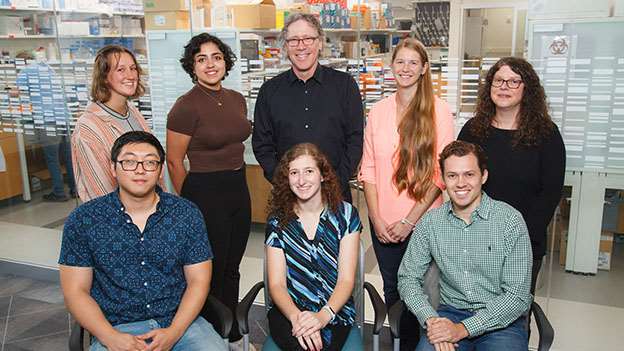Kirby Laboratory
Location
Microbiology & Immunology
BSB B2410
General Interests
Bacterial Signal Transduction, Microbial Communities, Predator-Prey Dynamics, Xenobiotic Disruption of Microbiomes

Research Areas
Microbiome
We are examining the role of xenobiotics for their capacity to disrupt the gut microbiota with deleterious consequences on host physiology and metabolism. Disease models used in the lab are a salt-sensitive rat model for hypertension, a mouse model of diet-induced obesity, and a mouse model of obesity induced by the second-generation antipsychotic risperidone. We perform physiological measurements related to each disease model, fecal material transfers to establish a causal link between the microbiota and disease, and 16S rDNA and metagenomic sequencing to analyze taxonomic and functional composition of the microbiota. Metagenomic analyses allow us to identify and test candidate probiotic strains of bacteria with specific metabolic features that influence the progression of disease. We have filed a patent (US 2020/0016124 A1) based on our work leading to reduction of weight gain and are in discussions to create a startup company.
Predator-Prey Interactions
The above work is a direct product of our understanding of bacterial interactions between Myxococcus xanthus and Bacillus subtilis as a model for microbial predator-prey interactions. Our primary goal is to assess the role of specialized metabolites produced by both the predator and the prey. Detailed molecular mechanisms for predator-prey interactions in vitro provide insights into gut-based systems in rodents and humans.
Current Members





Recent Publications
-
(Kazen AB, Umfleet LG, Aboulalazm FA, Cohen AD, Terhune S, Mason L, Obarski S, Franczak M, Kindel T, Wang Y, Kirby J.) Alzheimers Dement. 2025 Dec;21 Suppl 2:e097652 PMID: 41442536 SCOPUS ID: 2-s2.0-105025871366
-
(Aboulalazm FA, Kazen AB, deLeon O, Müller S, Saravia FL, Lozada-Fernandez V, Hadiono MA, Keyes RF, Smith BC, Kellogg SL, Grobe JL, Kindel TL, Kirby JR.) Gut Microbes. 2025 Dec;17(1):2477819 PMID: 40190120 PMCID: PMC11980487 SCOPUS ID: 2-s2.0-105002217346 04/07/2025
-
Gut microbiome and bile acid changes after male rodent sleeve gastrectomy: what comes first?
(Welsch EC, Barron MR, Storage KM, Kazen AB, Aboulalazm FA, Kirby JR, Kindel TL.) Am J Physiol Regul Integr Comp Physiol. 2025 Sep 01;329(3):R410-R421 PMID: 40695592 PMCID: PMC12372987 SCOPUS ID: 2-s2.0-105013897632 07/23/2025
-
Race-related host and microbe transcriptomic signatures in triple-negative breast cancer.
(Kumar R, Duyar-Ayerdi S, Sundaresan A, Srinivasasainagendra V, Pedamallu CS, Behring M, Chandrashekar DS, Eltoum IE, Varambally S, Tiwari HK, Shrestha S, Auer PL, Chaudhary LN, Kirby JR, Yates C, Manne U, Ojesina AI.) NPJ Breast Cancer. 2025 Aug 08;11(1):87 PMID: 40781241 PMCID: PMC12334597 SCOPUS ID: 2-s2.0-105012896561 08/09/2025
-
Gut microbial contributions to thermogenesis.
(Kazen A, Grobe JL, Kirby JR.) J Exp Biol. 2025 Jul 15;228(14) PMID: 40642960 PMCID: PMC12276805 SCOPUS ID: 2-s2.0-105011085208 07/11/2025
-
Reutericyclin mitigates risperidone-induced suppression of anaerobic energy expenditure.
(Hadiono MA, Kazen AB, Aboulalazm FA, Burnett CML, Reho JJ, Kindel TL, Grobe JL, Kirby JR.) Am J Physiol Regul Integr Comp Physiol. 2025 Jun 01;328(6):R741-R757 PMID: 40235074 PMCID: PMC12128854 SCOPUS ID: 2-s2.0-105006676606 04/16/2025
-
Gut Microbiota and Neurovascular Patterns in Amnestic Mild Cognitive Impairment.
(Kazen AB, Umfleet LG, Aboulalazm FA, Cohen AD, Terhune S, Mason L, Obarski S, Franczak M, Kindel TL, Wang Y, Kirby JR.) Brain Sci. 2025 May 22;15(6) PMID: 40563710 PMCID: PMC12190368 SCOPUS ID: 2-s2.0-105009035769 06/26/2025
-
(McAllister CT, Ronk AM, Stenzel MJ, Kirby JR, Bretl DJ.) J Bacteriol. 2025 Feb 20;207(2):e0028024 PMID: 39868781 PMCID: PMC11841059 SCOPUS ID: 2-s2.0-85218998573 01/27/2025
-
Sleeve Gastrectomy Protects Against Hypertension in Rats due to Changes in the Gut Microbiome
(Barron M, Fernando DG, Atkinson SN, Kirby J, Kindel TL.) Journal of Surgical Research. September 2024;301:118-126 SCOPUS ID: 2-s2.0-85196756485 09/01/2024
-
(Fernando DG, Saravia FL, Atkinson SN, Barron M, Kirby JR, Kindel TL.) Surg Endosc. 2023 Feb;37(2):1476-1486 PMID: 35768736 PMCID: PMC11984501 SCOPUS ID: 2-s2.0-85133186635 06/30/2022
-
(Müller S, DeLeon O, Atkinson SN, Saravia F, Kellogg S, Shank EA, Kirby JR.) Front Microbiol. 2023;14:1295262 PMID: 38075900 PMCID: PMC10704990 12/11/2023
-
(Reho JJ, Nakagawa P, Mouradian GC Jr, Grobe CC, Saravia FL, Burnett CML, Kwitek AE, Kirby JR, Segar JL, Hodges MR, Sigmund CD, Grobe JL.) Front Physiol. 2022;13:855054 PMID: 35283781 PMCID: PMC8914175 SCOPUS ID: 2-s2.0-85126220642 03/15/2022


